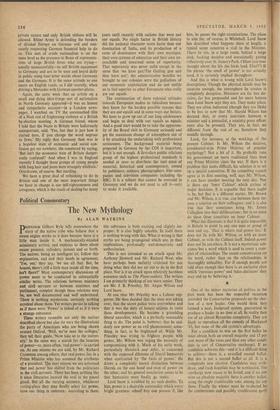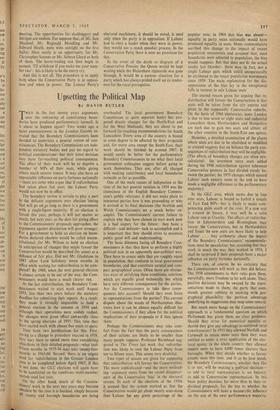Political Commentary
The New Mythology
By ALAN WATKINS
pROFESSOR Gilbert Ryle tells somewhere the story of the native tribe who believe that a steam engine works as it does because there is a little man inside it. A mechanically-minded missionary arrives, and explains to them about steam pressure, cylinders, pistons and so forth. The natives, being an intelligent lot, follow this explanation, and nod their heads in agreement. 'Yes, yes,' they say, 'we see all that. But, be honest, there's still a little man inside all the time, isn't there?' Most contemporary discussions of power seem to be conducted in substantially similar terms. The relations between ministers and civil servants or between ministers and parliament, complex though these relations may be, are well documented and well understood. There is nothing mysterious, certainly nothing mystical about them. Yet writers persist in talking as if there were. 'Power' is talked of as if it were a strange substance.
These writers resemble not only the natives described above but also (to vary the illustration) the party of Americans who are being shown around Oxford. 'Well, we've seen the colleges,' they tell their guide. 'Now take us to the univer- sity.' In the same way a search for the location of power—or, more often, 'real power—is carried on. At one minute we are told, by Mr. Richard Crossman among others, that real power lies in a Prime Minister who has assumed the attributes of a president. The next minute we are informed that real power has shifted from the politicians to the civil servants. There has been nothing like it since Descartes located the soul in the pineal gland. But all the varying accounts, whichever resting-place they may finally select for power, have one thing in common : according to them, this substance is both exciting and slightly im- proper. It is also highly saleable. In itself there is nothing wrong with this. What is wrong is that myths are being propagated which are, in their implications, profoundly anti-democratic and authoritarian.
This is not intended as an attack upon Mr. Anthony Howard and Mr. Richard West, who have perhaps been unfairly criticised for not doing what they did not set out to do in the first place. Nor is it an attack upon relatively harmless nonsense such as The Plane-makers. The writers I am primarily thinking of are more senior. They are Mr. J. B. Priestley, Mr. Angus Wilson and Lord Snow.
At one time Mr. Priestley was a Labour sup- porter. He then decided that the state was taking over, that the secret police were everywhere and that it was the duty of honest citizens to resist these developments. He became a grumbling liberal anarchist, which is a perfectly reasonable thing to do. The point is, however, that he sud- denly saw power as an evil phenomenon; some- thing, in fact, to be frightened of. While Mr. Priestley was trying to frighten people with power, Mr. Wilson was urging the necessity of compromising with it. Much of his early work, particularly Hemlock and After, is concerned with the supposed dilemma of liberal humanists when confronted by 'the facts of power.' He draws a completely unreal distinction between liberals on the one hand and men of power on the other; and his general conclusion seems to be that humanists must finally go under.
Lord Snow is troubled by no such doubts. To him, power is a desirable commodity which every bright grammar school boy can possess if, like him, he passes the right examinations. The place to aim for, of course, is Whitehall. Lord Snow has described what happens there at length; a typical scene concerns a visit to the Minister. There he sits, in a large room, behind a large desk, looking decisive and occasionally gazing reflectively over St. James's Park. ('Have you ever thought about the life the birds lead, Eliot?') If the phrase 'the smell of power' is not actually used, it is certainly implied throughout.
And this is what is wrong with Lord Snow's descriptions. Though the physical details may be accurate enough, the atmosphere he creates is completely deceptive. Ministers are far less de- cisive, far less purposeful and far more human than Lord Snow says they are. They make jokes. They are often indiscreet (though they are likely to be less so now that Mr. Harold Wilson has decreed that, at every interview between a minister and a journalist, a ministry press officer must also be present). They arc, in fact, no different from the rest of us. Somehow they muddle through.
Look, for instance, at the workings of the present Cabinet. Is Mr. Wilson the decisive, presidential-style Prime Minister of popular mythology? Not a bit of it. He probably runs his government on more traditional lines than any Prime Minister since the war. If there is a problem that looks difficult, his solution is to set up a special committee. If the committee cannot agree at its first meeting, well, says Mr. Wilson, it can have another meeting the next day. Nor is there any 'inner Cabinet' which arrives at major decisions. It is arguable that there ought to be, but that is a different matter. Mr. Brown and Mr. Wilson, it is true, can between them im- pose a solution on their colleagues; and it is also true that they sometimes bring Mr. James Callaghan into their deliberations: but in no sense do these three constitute an inner Cabinet.
What this illustrates is that it is quite impossible in Britain to point to any one man or group of men and say, 'That is where real power lies.' It does not lie with Mr. Wils'on, or with an inner Cabinet, or with the Cabinet itself. Indeed power does not lie anywhere. It is not a mysterious sub- stance but a word which is used to cover a com- plex of relationships. The recent concentration on the word, rather than on the relationships, is thoroughly unhealthy. For if enough people are told often enough that there is an exclusive class which 'exercises power' and 'takes decisions' they may end up by believing it.
One of the minor mysteries of politics in the past week has been the respectful reception accorded the Conservative proposals on the elec- tion of a new leader. One would think they formed a neat, foolproof system, guaranteed to produce a leader in no time at all. In reality they are of an almost Byzantine complexity. They are likely to reproduce all the comedy of Blackpool '63, but none of the old system's advantages.
For a candidate to win on the first ballot he must obtain both an overall majority and 15 per cent more of the votes cast than any other candi- date (a sort of Conservative surcharge). If no candidate achieves this—and it is a difficult thing to achieve—there is a so-called second ballot. But this is not a second ballot at all. It is a completely new election. Candidates may with- draw, and fresh hopefuls may be nominated. The surcharge now ceases to be levied, and if no one wins an absolute majority there is another ballot, using the single transferable vote, among the top three. Finally the winner must be re-elected by the cumbersome and possibly troublesome party meeting. The opportunities for skulduggery and intrigue are endless. For suppose that, of Mr. lain Macleod, Mr. Reginald Maudling and Mr. Edward Heath, none wins outright on the first ballot. Here surely is an opportunity for Mr. Christopher Soames or Mr. Selwyn Lloyd or both of them. The horse-trading can then begin in earnest. 'I'll withdraw if you make me your num- ber two': this is likely to be the merry cry.
And this is not all. The procedure is to apply both when the Conservative Party is in opposi- tion and when in power. The Labour Party's electoral machinery, it should be noted, is used only when the party is in opposition. If Labour had to elect a leader when they were in power, they would use a much speedier process. In the Conservative Party there is now no provision for this.
In the event of the death or disgrace of a Conservative Premier the Queen would be kept waiting while the Blakenham rigmarole was gone through. It would be a curious situation for a party which has always prided itself on its tender- - ness for the royal prerogative.



































 Previous page
Previous page